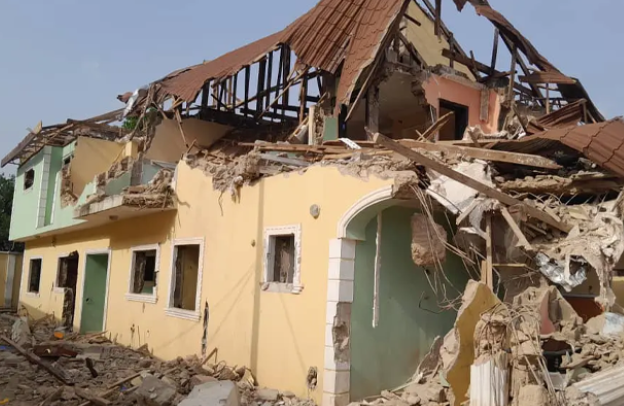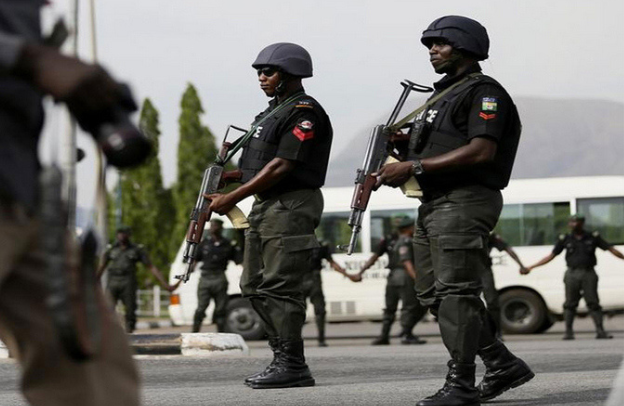Addressing the Growing Insecurity in Esanland and Uromi: 7-Day Open Letter, Protesting Insecurity in Esanland and Nigeria, 6-Day

On the sixth day of our 7-day open letter, protesting insecurity in Esanland and Nigeria, we turn our focus to Uromi, where fear has become a constant companion for the people. Armed groups and Fulani herdsmen, rising crime rates, and the breakdown of law and order have left these once-thriving communities in a state of constant anxiety.
Learn How to Leverage Your Story through our Story To Asset Framework.
The 7 protest letters are written by Obehi Ewanfoh, a Nigerian writer and a member of the African diaspora community in Italy. The letters are a direct response to the intensifying security crisis in Nigeria, with a particular focus on the devastating impact it is having on his homeland of Esanland.
Background Of The Situation Of Insecurity In The Country
Recently, the National House of Representatives urgently addressed the growing insecurity in Esan North-East and South-East Federal Constituency of Edo State, condemning the rising wave of violence that has plagued the region.
In response, lawmakers have called on the federal government to establish a military base in Uromi, Esan North-East Local Government Area, to enhance security and restore stability to the area.
This motion, introduced by Henry Okojie, a representative of Edo State, was driven by the alarming surge in violent crimes, including kidnappings, armed robberies, murders, and cult-related killings, which have left residents living in fear and trauma.
Okojie highlighted the increasing lawlessness along key routes in the region, such as the rail corridor from Uzea to Ugboha and nearby towns, where criminal activities have become rampant. Shockingly, reports of mutilated victims, with signs of organ harvesting, have further amplified concerns.
As the police struggle to contain the situation, the House of Representatives has taken a decisive step, urging security agencies like the DSS, Nigerian Army, and police to thoroughly investigate the escalating violence.
The call for a military presence in the region underscores the urgent need for a comprehensive security response to address the deepening crisis.
Today’s Letter Of Protest Against Insecurity in Esanland
To:
His Excellency, President Bola Ahmed Tinubu, Federal Republic of Nigeria,
His Excellency, Governor Monday Okpebholo, Edo State, Nigeria
The Heart of the Crisis: Insecurity in Esanland
The escalating insecurity in Esanland is not just a local issue—it is a crisis that threatens the entire region and the future of Nigeria. Uromi, a once-thriving town known for its vibrant culture and agricultural prosperity, has become a battlefield for criminal gangs and armed assailants.
In recent months, the people of Esanland have witnessed a terrifying surge in kidnappings, murders, and violent attacks. Farmers are no longer able to work their land, children are too afraid to go to school, and businesses are being shut down due to the escalating threat of violence.
In a BBC article, published on March 9, 2024, Yusuf Akinpelu, a BBC journalist in Lagos, highlighted a disturbing trend. After a brief lull, the mass kidnappings that have plagued Nigeria since the infamous abduction of nearly 300 girls from a school in Chibok in April 2014 are beginning to resurface again.
The recent mass abduction in Kaduna marks the largest school kidnapping since 2021. This resurgence raises critical questions: Why are these kidnappings, which primarily target the most vulnerable Nigerians, making a comeback?
While the timing of these incidents may seem coincidental, they serve as a stark reminder that the threat of mass abductions is far from over.
See also End the Reign of Terror in Esanland: Open Letter, Protesting Insecurity in Esanland and Nigeria
“Nigeria’s poor economy creates the conditions for kidnapping. Over the past year, the government has not been able to fix its foreign exchange problem,” William Linder, a retired CIA officer and head of 14 North, an Africa-focused risk advisory, told the BBC.
“Food prices have skyrocketed, especially over the past six months. The perception of corruption continues.”
In another report dated 15 March 2024, the Global Initiative Against Transnational Organized Crime raised an urgent question: “What does the recent escalation of mass abductions in Nigeria reveal?” The article highlighted the alarming rise in mass abductions across the country since late February 2024. In a particularly disturbing series of events, over 500 individuals have been kidnapped across Nigeria’s Northeast and Northwest regions.
On 29 February, suspected Boko Haram militants abducted at least 200 people, primarily women and children, from the northeastern state of Borno. In the Northwest, a series of abductions occurred in rapid succession beginning on 7 March.
Gunmen raided a school in the Chikun area of Kaduna, kidnapping 287 students. Just two days later, on 9 March, gunmen abducted 15 children from an Islamic school in Sokoto. Despite ongoing attempts to restore order, armed bandits struck again on 12 March, this time in the Kajuru area of Kaduna, abducting 61 more individuals.
These events only underline the growing insecurity, with authorities and local communities still reeling from the devastating impact. The recent spate of abductions paints a stark picture of the scale and severity of the security crisis gripping parts of Nigeria, leaving many to wonder when and how it will end.
This statement resonates deeply with the people of Esanland, where violent criminal groups now operate with alarming impunity. As a result, the residents of Uromi and its surrounding towns, though unfamiliar with such waves of violence in the past, now find themselves trapped in a perpetual state of fear and uncertainty.
The situation has become so dire that local law enforcement is unable to provide adequate protection, further deepening the sense of hopelessness among the community.
The Economic Devastation: Agriculture Under Attack
At the heart of Esanland’s economy lies agriculture. The region is known for its fertile land and hardworking farmers who grow cassava, yams, maize, and other crops that sustain both the local population and the national economy.
However, this vital economic sector has been decimated by insecurity. Farmers are afraid to work their land for fear of being abducted or killed by armed criminals. According to the United Nations, Nigeria has over 3 million internally displaced people (IDPs) due to violence and insecurity.
Esanland’s agricultural workers are now part of this tragic statistic, with families abandoning their farms and homes in search of safety.
See also Urgent Call to Action: Open Letter Protesting Insecurity in Esanland and Nigeria
According to the National Bureau of Statistics, agriculture accounts for approximately 23% of Nigeria’s GDP. However, as insecurity continues to spread across rural areas, this vital sector is experiencing a severe decline, exacerbating poverty and creating an artificial economic crisis for the people who depend on it.
In Esanland, the inability of farmers to plant and harvest crops has led to food shortages and an increase in poverty. Without urgent intervention, the effects of this insecurity will continue to undermine not only the local economy but also Nigeria’s broader economic development.
The Human Toll: Fear, Displacement, and Loss of Life
Insecurity has wreaked havoc on the social fabric of Esanland. Families have been torn apart by kidnappings, with loved ones taken and held for ransom. Innocent people have been murdered in cold blood, and entire communities have been displaced, forced to abandon their homes in search of safety.
Children, who once attended school with hope for a better future, now live in constant fear of abduction. Local businesses that once supported the community have shut down, leaving behind a barren landscape.
This growing crisis is taking a serious toll on the mental and physical well-being of the people. Stress, anxiety, and trauma are rampant, particularly among those who have lost family members or been displaced.
A recent study from the United Nations High Commissioner for Refugees (UNHCR) highlights the devastating impact of forced displacement, stating that insecurity has led to a surge in internally displaced people (IDPs) in Nigeria, many of whom face poor living conditions and lack access to basic services.
The Need for Immediate Intervention
The government’s failure to act decisively on the crisis in Esanland has not only emboldened criminals but also destabilized entire communities. The lack of security forces and the failure to restore order have created a vacuum that is being filled by armed assailants who prey on the vulnerable.
The absence of action undermines public trust in the government and exacerbates the sense of abandonment felt by the people.
See also Second Burial In Esan Weltanschauung: A Retrospective And Prospective Interrogation – Research Paper
As the Nigerian government grapples with widespread insecurity, the authorities must prioritize the security of citizens in areas like Esanland. Without urgent intervention, the violence in the region will continue to spiral out of control, leading to further displacement, economic collapse, and loss of life.
10-Point Recommendations for Immediate Action
To restore peace, security, and hope to Esanland, we, the Concerned Nigerians in the Diaspora, present the following 10-point plan for immediate action. These recommendations are not just a call for help—they are a demand for justice, peace, and a sustainable future for the people of Esanland:
- Establish a Military Base in Uromi
We urgently request the federal government to establish a military base in Uromi, Esan North-East Local Government Area. This strategic location will serve as a deterrent to criminal activities and provide a rapid response mechanism for both law enforcement and military personnel.
- Increase Police Patrols and Presence
We call for a significant increase in police patrols, especially in rural and farming communities. Regular patrols will help restore some semblance of order, deter criminal activities, and reassure the public that their safety is being prioritized.
- Strengthen Community Policing Initiatives
Community policing is a critical solution in the fight against insecurity. We recommend the recruitment and training of local youth to join law enforcement efforts, ensuring that security personnel understand the unique needs of their communities and can respond swiftly to threats.
- Establishment of state police in Nigeria
As part of our ongoing efforts to strengthen security and ensure the safety of all citizens, we recommend the establishment of state police in Nigeria. This will better address the evolving security challenges in Esanland and across the nation, providing more localized and effective responses to security issues.
- Deploy Surveillance Infrastructure
The installation of CCTV cameras in strategic locations across Uromi and other Esan communities will help in crime prevention and the identification of perpetrators. Monitoring critical areas like marketplaces, roads, and schools will deter criminals and offer evidence to prosecute offenders.
- Launch Public Awareness Campaigns
We recommend launching widespread safety campaigns in local schools, churches, and community centers. Educating residents on safety practices, emergency response, and the importance of reporting suspicious activities will empower the community to take action against criminals.
- Judicial Accountability and Speedy Trials
In addition to preventing crime, swift and fair trials for those implicated in criminal activities must be a priority. Convictions must be executed in a timely manner to serve as a deterrent and to restore the public’s trust in the justice system.
- Secure Grazing Grounds for Cattle Herders
We recommend that grazing grounds be designated to prevent cattle herders from invading farmland, causing destruction to crops, and leading to conflicts. This will not only reduce tension but will promote peace and cooperation between herders and farmers.
- Regular Forest Patrols
We ask the government to deploy patrols to monitor and secure the forests in Esanland. These forests have become hiding places for criminals who use them for kidnapping and other illicit activities. Securing these forests is essential to restoring security.
- Ethnic Cooperation and Security Collaboration
Lastly, to avoid potential ethnic tensions, all non-indigenous people in Esan, particularly those suspected of criminal activities, should work closely with security forces. Identifying and dealing with bad actors in our communities is essential for lasting peace.
Conclusion: A Final Plea for Action
Mr. President, Governor Okpebholo, the time for action is now. The people of Esanland can no longer wait. The violence, fear, and instability must be addressed before they destroy the fabric of our society.
If we do not intervene today, the lives of the people of Esanland will continue to be torn apart by violence, and the region will be lost to the scourge of insecurity.
We call on you to take immediate steps to implement these recommendations and restore peace and safety to Esanland. The people of Esanland deserve to live in a secure environment, free from fear and violence. It is your duty to ensure that this becomes a reality. Let us work together to bring hope to Esanland, restore its prosperity, and create a future where our people can thrive.
Learn How to Leverage Your Story through our Story To Asset Framework.
We wish for lasting peace and security to prevail in Esanland and throughout the Federal Republic of Nigeria.
Obehi Ewanfoh,
A member of the Nigerian/African diaspora community in Italy.





